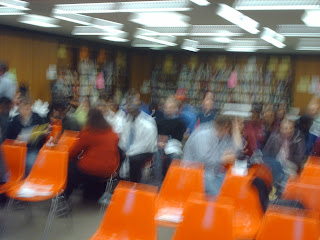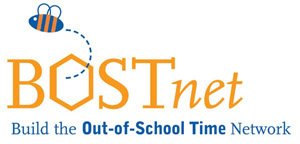
"The things they ask us to do for the money they give us is lunatic. I can't hire staff. When I do, I can't keep them. These children are such an issue, and I can tell you, it wasn't like this fifteen years ago. These kids are driving out my staff and scaring away parents with normal kids" a staff person told me in private.
Across the board there are reports of increased behavior problems at out-of-school programs. There are many speculations as to why this is.
Many believe that it is video games and the media.
Others, say that it is parents who lack proper parenting skills or who are high stressed because of the economy or other concerns.
There are some who way that vouchers are seen as an increasing source of predictable revenue in a time when funding is seen as capricious, inconsistent, and never enough for the level of work and quality that is demanded.
Our Boston Roundtable attempted to address some of the challenges around behavior and put these challenges in context. There is no way we could expect to solve all the individual issues and challenges, however, we wanted to try to step back from our individual children - our little Johnny and Jane Does - and look at behavior as an expression of:
The environment of the program (community, families, culture, etc)
The group management by individual staff
The result of approach (fun engaging activities, negotiating and discussing with children rather than power struggles)
How staff work with each other and are self-aware of their own management style
We started off the roundtable with a short discussion of issues as people experienced them. We heard of children unafraid of consequences, unwilling to learn to modify their behavior, who had involved parents - but those parents never changed their behavior or used corporal punishment or had other cultural perspectives not in keeping with the program - and staff who were asked to give a level of care to children they were untrained to provide and for which additional resources were not given. From this discussion we transitioned into an interactive presentation. We looked at environment and approach and touched on issues related to building a program that promotes positive behavior.
At the basics, positive behavior promotion is common sense. Common, if you tend to think that way. However, as we heard from many in the group, dialoging with a child so that a challenge becomes a teachable moment, giving children options for their activity to meet their needs, and allowing for more give and take as well as a higher tolerance for "childish" behavior that has in recent times become forbidden in school does not seem to be the common sense experience of so many children who have only known a new authoritarianism that does not seem to teach children how to behave or regulate themselves. We worked to unpack some of these issues, seeing that there was no simple "in-the-box" strategies but there was a framework we could apply to look at behavior in a different light.
First, behavior issues are part of our work. We won't ever and cannot "solve" it in a finite manner. This is part of our continuous improvement of the children themselves as well as our programs. We need to examine what it is that we are asking of our children. What are the "good" behaviors? Write them down on paper. Look at the list. How long is this list, what do these positive behaviors look like in action? Knowing our children, and how they need to play and invent games as well as be social and spend their energy, what of these expectations we have are realistic? Are we asking children who are sitting for hours to sit an additional three? With these behaviors, then what are ways we can promote them. That is, to reduce the number of reprimands and increase the number of times children hear what they are doing good. Look not to build complex systems and reward charts - or create charts where the entire group benefits from positive behavior. We have to think of the fun we can have in our programs and how our children can contribute to that fun by their positive behavior - after all, what is in it for them to behave? To make your work life easier? Well.... at a certain point, that's what we want. Now, what do they want?
We moved from a semi-formal presentation to our large group activity. It went very well. It is a simple activity to do with staff - and perhaps you can modify it for your children.
We took colored candies. Everyone got one, but could not show it to others. Each color was assigned a set of personality traits. People were to group up with others, but were not able to show their colored candy nor say any of the words on the list. After about 15 minutes, we looked at the groups we had. As it turns out, the majority of the room found their like-minded people and formed those groups. Afterwords, we discussed what was it like to be given a personality trait selected by another? How did you present your personality trait? How did you find your group/ select your group? Did you group up with similar people? How did you know? What made you select the particular group you selected? What are some lessons you feel apply to your work with children?
This activity is based on the numerous personality tests and associated prevalence of diagnosing behavior as defined “thing” and our popular understanding of personality (the “type A theory” etc.) This activity explores the way a “diagnosis” may alter behavior (Stanford Prison Experiment) as well as how practitioners themselves assess not only their own behavior vis-à-vis an assumed identity, but how they identify others and form groups based on these “similar traits.”
This is much like the work of OST, where practitioners are given various individual children, some of which have recognized diagnoses and additional support in school but may not have these supports for OST nor may all the relevant information be shared with an OST practitioner along official channels. OST also is expected to provide supports to a heterogeneous group of children with various needs and do this both at an individual level and while maintaining a large group.
We closed the event and collected evaluations. Of our participants who reported to us, 85% found it a good use of time, with 60% of participants reporting learning something from the interactive presentation and 63% from the discussion. We had 95% of attendees providing direct service, 17% being supervisors,10% reporting leading any training at their program and only 3% involved in fund raising. The range of experience was from one week to over twenty-five years with the average in the room of 5.35 years (yes, weeks and months were factored in).
For more resources visit our website at www.bostnet.org and you can download the
Promising Practices Document.





